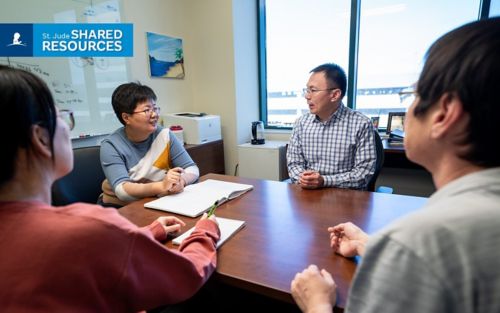Shared Resources Spotlight: Experimental Cellular Therapy Laboratory (ECTL)

“Serve St. Jude investigators.” This tenet of the Experimental Cellular Therapy Laboratory (ECTL) shared resource drives the accelerated clinical translation of the ever-evolving cutting-edge cellular therapies developed by St. Jude investigators.
Established in 2018, the ECTL focuses on developing GMP-compliant manufacturing processes for cellular products at a clinical scale, which include cell purification, engineering, genetic modification, expansion and cryopreservation.
Collaborative dynamics
Albert Zhou, PhD, ECTL director, emphasizes the laboratory’s pivotal role in accelerating the clinical translation of cutting-edge cellular therapies. “Without ECTL, the clinical translation process would take much longer,” Zhou stated. “We offer expertise to make these processes faster, protecting the precious time of the investigators. They can continue developing newer cutting-edge therapies.”
Another crucial aspect of the transition from preclinical work to the clinical process at ECTL is the preclinical processes often cannot be directly scaled up for clinical use. “We cannot just take the process in and start scaling up,” Zhou said. “We have to change lots of things. We cannot use many of the reagents that investigators use because they are non-clinical grade, meaning they are not safe for clinical use.”
The high cost of reagents and supplies underlines the unique challenges associated with ECTL’'s commitment to developing clinical-grade processes – as well as the benefits St. Jude investigators have in this shared resource.
A distinct collaboration
The ECTL collaborates closely with the Good Manufacturing Practice (GMP) facility, another shared resource at St. Jude. Their joint efforts are "a vital bridge between research labs and product production," said Jie Lin, PhD, a scientist at ECTL.
Regular meetings and data-sharing sessions facilitate effective communication. Additionally, ECTL staff, trained in GMP manufacturing processes, step in to provide manufacturing services when needed. The manufacturing experience offers opportunities for continuous process improvement and risk mitigation.
Cutting-edge partnerships
The ECTL team’s dedication to refining process development for cellular therapy products as they transition to GMP is evident in their close work with clinical investigators. “ECTL is a group of very knowledgeable and enthusiastic individuals that are very committed to streamlining process development as cellular therapy products are transitioned to the GMP,” said Paulina Velasquez, MD, St. Jude Department of Bone Marrow Transplantation and Cellular Therapy.
Velasquez acknowledges the ECTL team’s expertise and commitment to advancing cellular therapy research and development, saying, “Their collaborative nature and thoughtful insights enrich the overall process.”
During the past six years, the team has cultivated strong partnerships with key investigators in both the laboratory and clinical research settings. “Collaborative measures between the ECTL, St. Jude investigators and the GMP moderate the costly and highly regulated procedures of present and upcoming projects, resulting in an increased possibility of success and advancement,” said Jeoung-Eun Park, PhD, ECTL senior scientist.
Advancing science and impact
Improving processes applicable to cellular product manufacturing and more effectively generating Investigational New Drug (IND)-enabling data is at the heart of ECTL’s success. “For ECTL, we identify successes as we do our body of work for each project coming from a St Jude lab,” said Zhou. The pinnacle of success is submitting an IND application to the U.S. Food and Drug Administration (FDA) and its subsequent clearance — always a major milestone.
Zhou emphasizes that FDA clearance is a testament to the successful completion of ECTL’s job for a particular project. ECTL has achieved this feat with its contributions to IND submissions for various projects, including CD123-CAR for acute myeloid leukemia (AML), memory T cell CAR for acute lymphoid leukemia (ALL), B7-H3-CAR for solid and brain tumors, CD70-CAR for AML and a hematopoietic stem cell genome-editing product for sickle cell disease.
ECTL’s goals extend beyond approvals, highlighting the ongoing commitment to improvement during clinical trials. “Together with the investigators of approved protocols, we identify opportunities to improve during the clinical trial,” Zhou remarks.
This commitment to refinement was exemplified during the AML clinical trial. The ECTL team identified a significant opportunity to enhance the product and successfully implemented changes by incorporating a small molecule called Dasatinib into the manufacturing process to improve the function of the product. This meticulous approach to improvement resulted in approval of the change by the FDA.
“Anything we change is considered very thoroughly. We discuss it with the stakeholders and ensure this is something worth changing by balancing the risk and benefit,” Zhou said, reflecting on the direct connection between ECTL’s work and patient outcomes.
The vigilance in ECTL’s facility stems from the realization that every change made directly impacts a patient, often within a short period.
Cultivating strategic preparation for advancements
The unique personnel structure of the ECTL facility ensures that every team member is versatile and capable of contributing to various aspects of the projects.
“We foster a culture of deep scientific expertise. Cross-training within the team also elevates the collaborative spirit needed for success,” noted Lin. The focus on developing a robust team allows ECTL to manage the demanding nature of cellular therapy projects efficiently.
As the field evolves, ECTL is keeping an eye on the future, particularly in the realm of individualized medicine and gene therapy. Ongoing projects such as PARADIGM, highlight the St. Jude commitment to addressing genetic-driven bone marrow failure syndromes on an individual level. “We’ll be thinking about and developing what will be needed to support this initiative,” Zhou emphasized. The ECTL facility is actively preparing for potential advancements in the field and staying ahead of emerging technologies.






